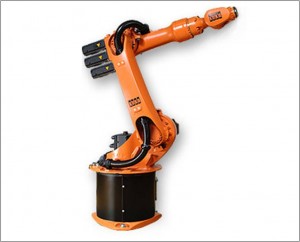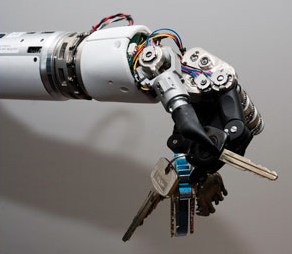or Mechatronic Engineering, humourously (but incorrectly) referred to as Megatronics at times. In Afrikaans Megatronika or Megatroniese Ingenieurswese. What is it? What can you do with it? When I started studying I didn’t know, after 5 years I think I have a vague idea. So below I’m going to post what I know.
In it’s simplest form it’s a combination of Mechanical and Electronic Engineering. If I really don’t feel like explaining, I simplify it to robotics. This is certainly a large portion of Mechatronics, but by no means a limiting factor.
Mechatronics as a named profession is fairly new, but the idea has always been there. In the South African context, UCT have had an accredited BSc (Eng) Mechatronics course since 1997 (although how long it has actually been running is uncertain), NMMU a BEng since 2007 (first graduates) and Stellenbosch since 2005 [1]. Potchefstroom University (NWU) are apparently aiming to start a course in the next few years [2]. Although not offered in the BEng format, UKZN do offer Masters through their Mechatronics and Robotic Research Group [3]. [EDIT: added list of BTech degrees and Diplomas offered at the bottom of the post]
Mechatronics at Stellenbosch [2]
I completed my BEng Mechatronics at Stellenbosch University in 2011. The Mechatronics course was presented by the Department of Mechanical and Mechatronic Engineering in a four year course. The first two years were identical to that of those studying towards a BEng Mechanical. The first year course is identical for all engineering students. In the third and fourth years, the two courses still followed similar routes, with the Mechatronics course replacing several Mechanical courses with some courses presented by the Department of Electronic and Electrical Engineering. In third year these included Electronics and Computer System’s courses and fourth year Electronics and Electronic Design Courses. Losing out on some Strength of Materials and Thermo-Fluid Mechanics.
The department put it this way [6]
The most important difference between the mechanical engineering programme and the mechatronic programme is that mechanical engineers are equipped to develop mechatronic systems with existing controllers (computers, PLC’s, etc.), while mechatronic engineers are also equipped to develop specialised controllers (e.g. for embedded controllers) and the relevant electronics themselves.
At the time, the Head of Department felt that Mechatronics as an entity was still too new. Employers weren’t advertising for Mechatronic Engineers, and didn’t really know what to do with them when they did get them. This resulted in the close ties between the Mechanical and Mechatronic courses. I was often unhappy about this, having would of preferred more focus on the Electronics, but in the end it worked out. And the HoD’s opinions were/are valid.
When I chose Mechatronics, I didn’t know where I was going to work, I chose the course because it sounded interesting. It wasn’t until my final year that I found a direction to work towards. Course setups at different universities are going to be different, and will put emphasis on different subjects, that doesn’t necessarily make one better than the other. Either way you’re going to come out of it with a degree and a fair amount of knowledge. Most importantly though (and this is true for any engineering degree) is you’ll know how to learn.
I’m quite confident that specific things that I learn in my first year of work will be of more value to my career than a specific subject at varsity, but having struggled through several subjects, I know I can figure out most things that come my way. I know where to look and how to go about solving problems.
In my final year we were a class of 85 Mechanical/Mechatronic students, of which I’d say about 30-35 received their BEng Mechatronics in 2011.
Mechatronics at NMMU [2]
NMMU have a slightly different setup. Mechatronics is presented by the Mechatronics school of the Department of Engineering, the Built Environment and IT. Mechatronics is the only Engineering degree they offer. As such, first year physics and maths are taken alongside BSc students and after the first year, courses taken are aimed only at Mechatronics students. The format of the course is still identical to that of when it started giving a good balance of subjects. The University also offers an array of BTech degrees in other Engineering fields.
I’m currently pursuing my master’s degree at NMMU. Their 4th year BEng Mechatronics class has roughly 25 students in it and the 3rd year class about 30. First year applications are limited to 60, with the most recent 1st year class starting with 50 students. The Mechatronics department is currently sponsored by General Motors South Africa (who have a plant in PE) and also have close ties to the Volkswagen plant in Uitenhage.
Mechatronics in General
Mechatronics as a career is still finding its feet. Meaning many consider it a jack of all trades, master of none type of situation, and although the course may feel that way, it’s certainly not the end of the story.
Mechatronics isn’t a new field, it’s just finally been given a name. When you tell people you’re a Mechatronic Engineer they don’t know what that is. I had a month stint at a large production facility as part of vacation training and I was asked to choose between focusing on their Mechanical or Electrical divisions, eventually settling for a bit of time at each. But that’s how businesses in SA are structured. This will change.
Several Mechatronic Engineers that I know have taken up Automation maintenance posts. Nothing wrong with this, personally it’s not where I want to be. Contrary to this though, my first job next year will be in automation maintenance. I however plan to use this as a stepping stone into a design career.
Automation is fun, and whereas I am going into automation in a production sense, automation also relates to smaller and/or more technical situations. The recent landing of the Curiosity rover on Mars is a perfect example of Mechatronic systems. There are several elements here, from the automated landing system to the remote control of the device.
In the motor industry, systems such as traction control, ABS and ESP are all examples of Mechatronic systems. Heavily complicated systems that rely on the processing of data from sensors to enable control of actuators. As such a Mechatronic Engineer can make him/herself home in many different industries. These include the Automotive, Aerospace, Manufacturing, Medical and Communications Industries.
Mechatronic Engineers can register with ECSA to become Professional Engineers [4]. The industry is governed by the South African Institute for Mechanical Engineers. I don’t see Mechatronics separating from this tree any time soon. The degree, being accredited by ECSA also means that the degree will be recognised internationally in many countries thanks to the Washington, Sydney and Dublin Accords [5]
So what do you do when you have your degree? You do whatever you want. You’ll find something. I’m not aware of any of my colleagues who are currently not pursuing a post-graduate degree or are employed. Not all of them are in Mechatronic specific posts. Some have opted for more mechanical orientated jobs, while others have gone entirely into areas such as electronic design or programming. And that’s one thing, a degree in Mechatronic Engineering in no way limits you. Very few engineering degrees will actually.
After re-reading what I’ve written, I think I’ve put forward some information relating to Mechatronic Engineering, but it’s still left fairly vague, maybe it’s just because none of us know what we’re really doing :)
A National Diploma in Mechatronics (for registration as a Professional Engineering Technician) can also be had from the following institutions [7]:
- Tshwane University of Technology
- UNISA
- Cape Peninsula University of Technology
A BTech in Mechatronics (for registration as a Professional Engineering Technologist) from [8]:
- Tshwane University of Technology
- UNISA
- Cape Peninsula University of Technology
and to reiterate, a BEng, or BScEng (for registration as a Professional Engineer) [1]:
- Stellenbosch University
- University of Cape Town
- Nelson Mandela Metropolitan University
Note: Although other institutions may offer courses in Mechatronics, or Mechanical Engineering with a focus on Mechatronic elements, the ones listed above are the only ones recognised by ECSA for registration as a mechatronic professional. Information was correct at time of posting, but may have changed since.
There are also several Universities of Technology and FET Colleges which offer courses in Mechatronics. CPUT is one of these institutions. Another training institution is Umbilo Training Specialists in Durban. They are running a free training course, once a month where anyone can come to learn more and expand their knowledge. Checkout their page for details.
For some more reading and a very complimentary view with some poignant remarks have a read here.
As part of my degree at Stellenbosch University I completed a project which can be seen here.
As part of my master’s degree at NMMU I completed a project which can be seen here and here.
If you’re looking for bursaries, try this website.
If you have any questions, feel free to ask in the comments section.
- [1] ECSA – Accredited Universities
- [2] Much of what is stated comes from my own experiences and conversations with relevant people.
- [3] UKZN – Mechatronics and Robotics
- [4] ECSA – Registration
- [5] ECSA – Recognised Qualifications
- [6] Stellenbosch University – Mechatronic Engineering
- [7] ECSA – Accredited Diplomas
- [8] ECSA – Accredited BTech





hi gareth!!;
am a zambian student at the copperbelt univesity and i have majord in mechatronics!;! i had a problem choosin between mechanical and mechatronics but now that i have am having cold feet abt my choice!!! most industries if not all dont recognise mechatronics a field of relevance!!! i know u’ve done mechatronics but advice on what to do man confused!!! when it comes to passion the two fields carry equal weight!!! wat do u think?????
Hey Lukundo
You shouldn’t be limited by your choice. Companies might not traditionally request mechatronic engineers, but look at the adverts for different jobs, just because they ask for a mechanical or electronic engineer, doesn’t mean that you as a mechatronic engineer won’t be a better fit for the position.
Hi Gareth
am currently studying at Tshwane University of Technology doing my semester 5 in a National diploma for Mechactronics. Ive been struggling to find vacation work for this july and as well finding a company for my practicals, I kindly ask to help me find a suitable intake
Hi nkululeko. I’m sorry I can’t really help. Vac work is always difficult to get, but speak to lecturers at the university and friends to try and help.
Hi Gareth um passionate about Mechatronics since i found out that its a combination of information technology + mechanical and electrical bt i have only 1 problem which makes me indecisive. i don’t know which institutions to pursue my career to as Unisa offers it under electrical mechatronics eng and tut just mechatronics eng are they equivalent?
Hi karabo, read my full post above. I go in to as much detail as I know on the various courses. If you have a specific question I can try answer it
Hello Gareth
I tried reading on universities websites but I couldn’t get the info I wanted.Let’s say I wanted to change an Eng programme and University from mech to electro-mech can some modules get credits or do I restart?what requirements do they have for modules?Lastly is it possible to be a Electro-mech engineer after getting a mech degree?
Most universities will let you switch and give you credit on many of your subjects, however this differs between varsities and the exact course you’re doing. It’s best to contact the university you want to switch to directly to get the information.
You can get a job in line of work regardless of the course you study. Try to ensure that your final year project aligns with the line of work you want to go into. While not a requirement it can help.
Hi Gareth
Thank you so much for shedding light on Mechatronics. I literally was told about it two days ago by one of my moms colleges. seeing this has really helped me understand what it is and where to go looking for it. Thank You Thank You Thank you.
Regards
Seeiso
Glad to have helped Seeiso. Good luck!
Hi Gareth
my name is Andile from south africa.i am currently doing my first year in mechatronics engineering i’ve been told that mechatronic its a difficult course to find a job after graduation..but now , after i visited your blog i can tell that the is no such thing..mechatronics is really quite interesting and world wild regognised…Thanks for the info
Hi Andile, there are lots of jobs available, but it depends on what work you want to do. Good luck with the course there are a wide variety of opportunities.
Hi Gareth. I’ve been trying to check out some Mechatronics engineering scholarships for foreign students but I’m not really satisfied. Which ones do you know or can you recommend?
Hi Ompha,
It’s unlikely that you will find scholarships in South Africa aimed at foreign students. If you contact your institution’s bursary department they should have a list of specific supports that may request applications from foreign students.
However, most of the big businesses who offer bursaries will be open to foreign applicants as well.
Thanks Gareth.
hi. thank u for yr post, it was really helpful.
however, i still need yr help/advice.
i am a nigerian and i have a great passion for robots and robotic engineering. but this is something i cant get in my country. do u think that studying mechatronics will lead me to achieve my dreams (creating my own robots)? do u think its a wise thing for me, a nigerian to make plans about going down to south africa for my studies or is there any other country where i can get my education? pls i need all the help i can get. i am too passionate about this dream but do not know how to go about it. i am a high school graduate and i am very good in mathematics and all other sciences. i won a national maths competition in 2014. thanks
Hi. It’s great to hear about your enthusiasm for robotics. I only really have a bit of an idea of studying Mechatronics in South Africa, I have very little understanding of the situation in other countries. Coming from Nigeria, I don’t know what your best option is. South Africa is obviously a possibility, but at the same time there are hundreds of institutions in Europe and several in the Middle-East as well which may be possibilities for you. I don’t know what your financial situation is like, or what studying opportunities there are in Nigeria, but if you’ve done well in olympiads and other events, try approaching the sponsors of those events for funding or opportunities to get educated.
I hope this helps at least a little.
Good luck.
hey Gareth I am currently doing my grade 11 at Johannesburg springs and I want to do mechatronics but the thing is, I heard that the Universities within Gauteng do not offer mechatronics courses of optimal depth meaning most of their courses can only qualify one to be a technician only, so is there an institution that offers the proper course in gauteng?
Hey Morgan
UCT, Stellenbosch and NMMU are the only institutions accredited to offer a BEng Mechatronics degree. Other institutions can only offer BTech and DipEng qualifications.
You can also study Mechanical engineer at several other institutions; UP for instance offers a specialisation into Mechatronics as an option for 4th year Mechanical Engineering students. Your final degree will then be BEng Mechanical, but you will have some more insight into Mechatronics.
I was wondering is UNISA as good as uct when it comes to studing mechtronics
UCT is a university for full-time students and offers a BEng qualification in Mechatronics. UNISA on the other hand is more focused towards part time, or distance learning, they also only offer a BTech and DipEng qualification.
Personally I don’t think you will learn as much part time as you will studying a degree full-time. This doesn’t mean what UNISA offers is bad, it has its place, but it isn’t the same.